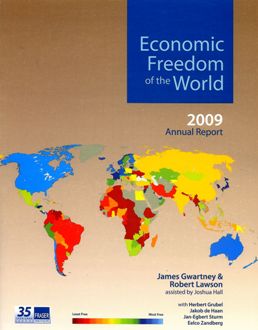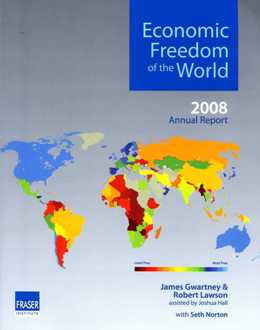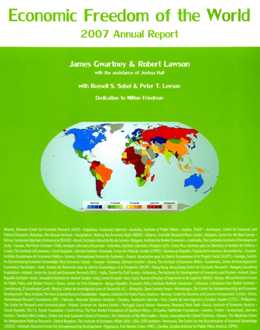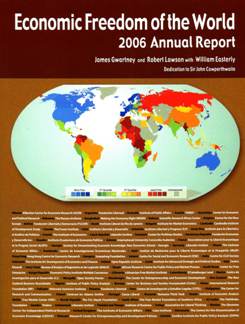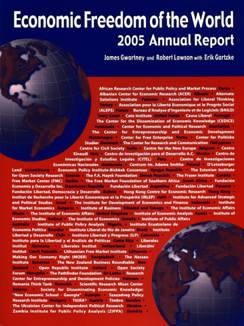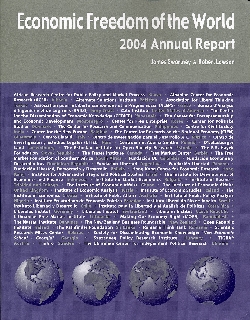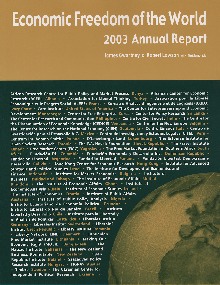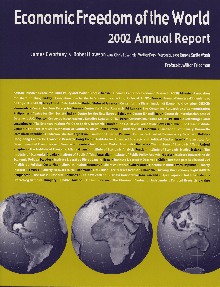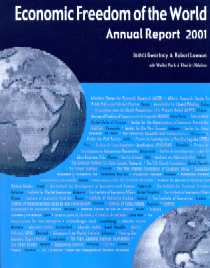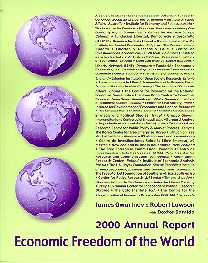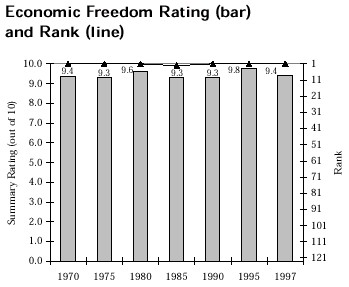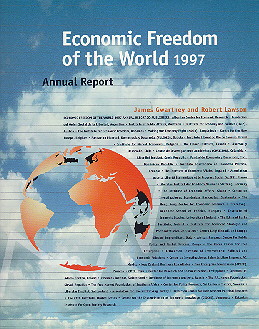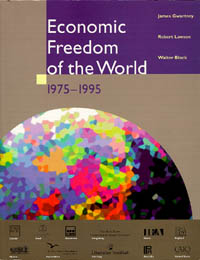|
||
Economic Freedom of the World |
||
|
Honk Kong is followed by Singapore, New Zealand, Switzerland, and Chile. The 2009 report is based on data from 2007, the most recent year for which comprehensive data are available. This year’s report also includes new research that examines the likely impact of the global recession on levels of economic freedom. It suggests that economic freedom may decline in the short term in response to crises, but over a longer time, economic freedom has a tendency to increase after a banking crisis. “Opponents of economic freedom are blaming the global recession on the operation of markets and hoping to use it as an excuse for a vast expansion in government. But even in recession, the quality of life in nations with free and open markets is vastly superior to that of nations with government managed economies,” said Fred McMahon, Fraser Institute director of trade and globalization studies. “To successfully navigate the global financial crisis, nations must focus on policies that support the principles of economic freedom. By choosing this path, the current crisis will be reversed and fade into history. But if we learn the wrong lessons and choose reforms and policies inconsistent with economic freedom, our destiny will be like the generation of 1930; we will face a decade of stagnation and decline.” The annual peer-reviewed Economic Freedom of the World report is produced by the Fraser Institute in cooperation with independent institutes in 75 nations and territories. The Economic Freedom of the World report uses 42 different measures to create an index ranking countries around the world based on policies that encourage economic freedom. The cornerstones of economic freedom are personal choice, voluntary exchange, freedom to compete, and security of private property. Economic freedom is measured in five different areas: (1) size of government; (2) legal structure and security of property rights; (3) access to sound money; (4) freedom to trade internationally; and (5) regulation of credit, labor and business. Research shows that individuals living in countries with high levels of economic freedom enjoy higher levels of prosperity, greater individual freedoms, and longer life spans. “Economic freedom is the key building block of the most prosperous nations around the world. Countries with high levels of economic freedom are those in which people enjoy high standards of living and personal freedoms. Countries at the bottom of the index face the opposite situation; their citizens are often mired in poverty, are governed by totalitarian regimes and have few if any, individual rights or freedoms,” McMahon said. International Rankings In this year’s main index, Hong Kong retains the highest rating for economic freedom, 8.97 out of 10. The other top scorers are: Singapore (8.66), New Zealand (8.30), Switzerland (8.19), Chile (8.14), United States (8.06), Ireland (7.98), Canada (7.91), Australia tied with the United Kingdom (7.89), and Estonia (7.81). The rankings and scores of other large economies include Taiwan, tied for 16th with Finland and Mauritius (7.62); Germany, 27 (7.50); Japan, 28 (7.46); South Korea, 32 (7.45); France 33 (7.43); Spain, 39 (7.32); Sweden, 40 (7.28); Italy, 61 (6.95); Mexico, 68 (6.85); China, 82 (6.54); Russia, 83 (6.50); India, 86 (6.45); Argentina, 105 (6.10); and Brazil, 111 (6.00). Zimbabwe once again has the lowest level of economic freedom followed by Myanmar, Angola, and Venezuela. Several countries have substantially increased their ratings and improved their relative levels of economic freedom during the past decade. Estonia increased its score by nearly 2.0 since 1995 and it is now one of the freest economies in the world, ranking 11th overall. Lithuania and Latvia have increased their scores by similar magnitudes since 1995 and their 2007 scores are now greater than 7.0. Cyprus, Hungary, Kuwait, and Korea have also improved substantially and their scores are now 7.25 or more. Two African economies, Ghana and Zambia, have become substantially freer with scores of 6.97 and 7.16, respectively. But not all of the news is good. Economic freedom is regressing in several other countries. Zimbabwe’s score has fallen by 3.18 while Argentina has declined by 0.80 since 1995. During the same period, the scores for Malaysia and the Philippines have also fallen. Since 2000, Venezuela’s score has declined by more than 1.5, down to 4.07. During the same period, Nepal’s score dropped to 5.18 from 5.62. The United States has also declined by almost seventeenths of a point to 7.88 from 8.55 in 2000, which has sent the accompanying ranking down to 7th from 2nd in 2000. Economic Freedom and the Global Recession The 2008 edition of the Economic Freedom of the World report includes new research that examines the likely impact of the global recession on levels of economic freedom. The study looked at banking crises that took place in Norway and Sweden during the 1990s and found that although economic freedom may decline in the short term in response to crises, over a longer time, economic freedom has a tendency to increase after a banking crisis. In the case of Norway and Sweden, the banking crisis did not distract these countries from continuing with their market-based reform policies. “Even though a banking crisis can be very painful, it is an illusion that they can be fully ruled out by better government regulation. In fact, a case can be made that perverse regulations in combination with the creation of too much liquidity played a key role in the creation of the current crisis,” McMahon said. “The short-term response of governments will almost surely reduce economic freedom but history shows that this need not be the case over the long term. Several countries that have experienced financial crises have moved toward greater economic freedom in subsequent years. The impact on economic freedom depends on what we learn from the crisis. Will we move toward institutions and policies more consistent with economic freedom? Or will we politicize, micromanage, and expand the size and role of government?” About the Economic Freedom Index Economic Freedom of the World measures the degree to which the policies and institutions of countries are supportive of economic freedom. |
||
|
Singapore is ranked second followed by New Zealand in third. Zimbabwe once again has the lowest level of economic freedom among the 141 jurisdictions included in the study, followed by Angola and Myanmar. The annual peer-reviewed Economic Freedom of the World report is produced by Canada’s Fraser Institute in cooperation with independent institutes in 75 nations and territories. It uses 42 different measures to create an index ranking countries around the world based on policies that encourage economic freedom. The cornerstones of economic freedom are personal choice, voluntary exchange, freedom to compete, and security of private property. Economic freedom is measured in five different areas: (1) size of government; (2) legal structure and security of property rights; (3) access to sound money; (4) freedom to trade internationally; and (5) regulation of credit, labor and business. Research shows that individuals living in countries with high levels of economic freedom enjoy higher levels of prosperity, greater individual freedoms, and longer life spans. This year’s report also contains new research showing the impact of economic freedom on poverty reduction. “Economic freedom is one of the key building blocks of the most prosperous nations around the world. Countries with high levels of economic freedom are those in which people enjoy high standards of living and personal freedoms. Countries at the bottom of the index face the opposite situation; their citizens are often mired in poverty, are governed by totalitarian regimes and have few if any, individual rights or freedoms,” said Fred McMahon, Fraser Institute director of trade and globalization studies. International Rankings In this year’s main index, Hong Kong retains the highest rating for economic freedom, 8.94 out of 10. The other top scorers are: Singapore (8.57), New Zealand (8.28), Switzerland (8.2), the United Kingdom (8.07), Chile (8.06), Canada (8.05), Australia (8.04), the United States (8.04), and Ireland (7.92). The rankings and scores of other large economies are Germany, 17 (7.64); Taiwan, 18 (7.63), Japan, 27 (7.48); South Korea, 29 (7.42); Sweden, 33 (7.35); France, 45 (7.19); Italy, 49 (7.15); Mexico, 58 (6.98); India, 77 (6.59); China, 93 (6.29); Brazil, 96 (6.16); and Russia, 101 (6.12). Several countries have substantially increased their ratings and become relatively free during the past decade. Estonia increased its rating by 2.27 points since 1995 and is now one of the freest economies in the world. Lithuania and Latvia have increased their ratings by at least two points since 1995 and their 2006 ratings are greater than 7.0. The ratings of Cyprus, Hungary, Kuwait, and South Korea have also improved substantially and their ratings are now 7.3 or more. Two African economies, Zambia and Ghana, have become substantially freer with ratings of 7.13 and 7.04, respectively. However, African nations continue to occupy most of the bottom spots on the index with the lowest levels of economic freedom, joined by Venezuela and Myanmar. The 10 nations with the lowest levels of economic freedom are: Zimbabwe (2.67), Angola (4.10), Myanmar (4.19), the Republic of Congo (4.64), Niger (4.67), Venezuela (4.67), Guinea-Bissau (5.01), Central Africa Republic (5.01), Chad (5.12), Rwanda (5.23), and Burundi (5.23). “Weakness in the rule of law and property rights is particularly pronounced in sub-Saharan Africa, among Islamic nations, and for many nations that were part of the former Soviet bloc,” said James Gwartney, lead author of the report and professor of economics at Florida State University. “Many Latin American and Southeast Asian nations also score poorly for rule of law and property rights. The nations that rank poorly in this category also tend to score poorly in the trade and regulation categories, even though several have reasonably sized governments and sound money.” Economic Freedom and World Poverty The 2008 edition of the Economic Freedom of the World report includes new research from Gwartney and Seth W. Norton, professor of business at Wheaton College, examining the role of economic freedom in eliminating poverty with a particular focus on sub-Saharan Africa. They point out that numerous studies have shown that countries with more economic freedom grow more rapidly and achieve higher per-capita income levels than those that are less free; therefore, it would seem that this growth should also help reduce poverty. Gwartney and Norton note that since economic growth is the driving force underlying reductions in poverty, countries such as Chile, Peru, Thailand, Malaysia, South Korea, China, and India have seen their poverty rates decrease in recent decades because these countries have achieved rapid economic growth. “If a country adopts reforms supportive of economic freedom, will the wellbeing of the poor improve? Theory indicates that the answer to this question is “yes,” but substantial reductions in poverty are likely to take some time,” Norton said. “It will take time for the new policy direction to acquire credibility, investors and other decision-makers to respond to the more attractive environment, and the rate of growth to increase. As the higher level of economic freedom is sustained and the more rapid growth persists, poverty rates will fall, and they will fall by larger amounts with the passage of time.” The authors conclude that the institutions and policies of most sub-Saharan African nations are highly inconsistent with economic growth. The failure of the legal system to protect property rights, the roadblocks imposed by trade restrictions, and the heavy regulation and administrative costs imposed on business undermine economic growth because they stifle the gains from trade, entrepreneurship, and investment. Given that most of the sub-Saharan countries are relatively small, the high trade barriers are particularly damaging. In order to encourage economic growth in Africa, Norton and Gwartney recommend that African nations reduce and eliminate trade barriers and business regulations; improve their legal system; and develop an interstate highway system through Africa. About the Economic Freedom Index Economic Freedom of the World measures the degree to which the policies and institutions of countries are supportive of economic freedom. This year’s publication ranks 141 nations representing 95 per cent of the world’s population for 2006, the most recent year for which data are available. The report also updates data in earlier reports in instances where data have been revised. |
||
|
Switzerland was ranked fourth followed by the United States, United Kingdom and Canada all tied for fifth spot. Zimbabwe, Myanmar and the Democratic Republic of Congo had the lowest economic freedom ratings of the 141 countries measured. The annual peer-reviewed report uses 42 different measures to create an index ranking countries around the world based on policies that encourage economic freedom. The cornerstones of economic freedom are personal choice, voluntary exchange, freedom to compete, and security of private property. Research shows that individuals living in countries with high levels of economic freedom enjoy higher levels of prosperity, greater individual freedoms, and longer life spans. “These measures are part of a fundamental base needed to build a free and prosperous nation. A quick glance at the names of countries scoring lowest on the index quickly shows that without protection of property rights and judicial independence, there is little individual freedom and little in the way of prosperity,” said said Fred McMahon, The Fraser Institute’s Director of Trade and Globalization Studies. International Rankings In this year’s main index, Hong Kong retains the highest rating for economic freedom, 8.9 out of 10. The other top scorers are: Singapore (8.8), New Zealand (8.5), Switzerland (8.3), Canada (8.1), United Kingdom (8.1), United States (8.1), Estonia (8.0), Australia (7.9), and Ireland (7.9). The rankings and scores of other large economies are Germany, 18 (7.6); Japan, 22 (7.5); Mexico, 44 (7.1); France, 52 (7.0); Italy, 52 (7.0); India, 69 (6.6); China, 86 (6.3); Brazil, 101 (6.0); and Russia, 112 (5.8). The majority of nations ranked near the bottom are African and all the nations in the bottom 10 are African, with the exceptions of Venezuela and Myanmar. They are: Zimbabwe (2.9), Myanmar (3.8), the Democratic Republic of the Congo, (4.0), Angola (4.2), the Republic of the Congo, (4.3), Central Africa Republic, (4.6), Venezuela (4.9), Burundi (5.0), Chad (5.1), Togo (5.1) and Niger (5.1). Botswana’s ranking, tied for 38th with a score of 7.2, is the best among sub-Saharan African nations. Five nations increased their score by more than three points since 1980: Hungary (3.0), Peru (3.0), Uganda (3.2), Ghana (3.6), and Israel (3.7). Only three nations decreased their score by more than one point: Zimbabwe (−1.7), Venezuela (−1.7) and Myanmar (−1.3). Other nations that saw reductions are: Nepal (−0.7), Bahrain (−0.3), Hong Kong (−0.2), Malaysia (−0.2), the Republic of Congo (−0.2), and Haiti (−0.1). “Weakness in the rule of law and property rights is particularly pronounced in sub-Saharan Africa, in many parts of the Middle East, and for several nations that were part of the former Soviet bloc although some of these nations have shown improvement,” said James Gwartney, lead author of the report and a Professor of Economics at Florida State University. “Many Latin American and Southeast Asian nations also score poorly for rule of law and property rights. The nations that rank poorly in this category also tend to score poorly in the trade and regulation categories, even though several have reasonably sized governments and sound money.” This year 11 additional countries have been added to the index. These countries are Angola (4.2, 138th), Bosnia and Herzegovina (6.1, 97th), Burkina Faso (5.5, 122nd), Ethiopia (6.0, 101st), Kazakhstan (7.3, 32nd), Kyrgyz Republic (6.8, 60th), Lesotho (6.8, 60th), Mauritania (6.5, 76th), Moldova (6.5, 76th), Montenegro (6.8, 60th), and Serbia (5.6, 119th). Global Spread of Economic Freedom The 2007 edition of the Economic Freedom of the World report also includes new research from Russell Sobel, economics professor at West Virginia University, and Peter Leeson, professor in the study of capitalism at George Mason University, showing how economic freedom spreads between countries. Sobel and Leeson note that historically, many foreign policy decisions have been based on the notion that economic reforms in a few key nations would substantially improve the economies of other countries throughout the region – the so-called “domino effect.” The authors conclude that while economic freedom changes in one country have only a modest impact on neighbouring countries, when multiple neighbours experience simultaneous changes in economic freedom, the impact is much greater. Broad regional changes in freedom can and do have significant impacts on surrounding countries. By liberalizing trade with foreign nations, economically free countries can exert a positive, if modest, impact on economic freedom in less free nations. This research indicates that free-trade agreements allowing a number of nations to simultaneously coordinate trade liberalization could have a sizeable influence on spreading economic freedom to economically repressed regions of the world, Sobel and Leeson said. About the Economic Freedom Index Economic Freedom of the World measures the degree to which the policies and institutions of countries are supportive of economic freedom. This year’s publication ranks 141 nations for 2005, the most recent year for which data are available. The report also updates data in earlier reports in instances where data have been revised. The annual report is published in conjunction with the Economic Freedom Network, a group of independent research and educational institutes in over 70 nations. |
||
|
In new research published in this year's report economist William Easterly of New York University compares the impact of economic freedom and foreign aid on economic growth in the poorest nations. "The demand for foreign aid is typically made in the absence of any empirical evidence that it leads to benefits for recipient nations and without asking whether there are better approaches to poverty reduction for the international community to support," said co-author of the report, James Gwartney, Professor of Economics at Florida State University. "What the research in this edition of Economic Freedom of the World suggests is that economic freedom, rather than foreign aid, does have a powerful positive impact and is a better approach." Easterly demonstrates that foreign aid has no positive impact on economic growth in the poorest nations. His research shows that economic freedom has a strong and positive impact on prosperity in general and on helping lift nations out of poverty. Once economic freedom is taken into account, poor nations, far from being caught in a perpetual cycle of poverty, grow faster than rich nations. "A key component of the success created by economic freedom is the ability to experiment, find economically successful areas of production, and prune those that do not succeed so that resources may be transferred to where they are most productive," said Fred McMahon, The Fraser Institute's director of trade and globalization studies. International rankings In this year's index, Hong Kong retains the highest rating for economic freedom 8.7 out of 10, closely followed by Singapore at 8.5. New Zealand, Switzerland, and United States tied for third with ratings of 8.2. The United Kingdom and Ireland are tied for the 6th place. Canada receives a score of 8.0 and ranks 8th. Iceland and Luxembourg are tied for 9th place. The rankings of other large economies are Germany, 17; Japan, 19; France, 24; Italy, 45; Mexico, 60; India, 53; China, 95; Brazil, 88; and Russia, 102. Among those nations that have made substantial gains in economic freedom since 1985 are Hungary, Iceland, El Salvador, Zambia, Poland, Bolivia, Israel, Ghana, Uganda, Peru, and Nicaragua--though some of these began at very low levels or have experienced ups and downs over the period. Among those nations that have registered significant losses in economic freedom since 1985 are Myanmar, Venezuela, and Zimbabwe. Most of the lowest-ranking nations are African, or former communist states. Botswana's ranking of 35 is the best among continental sub-Saharan African nations. Chile, ranked at 20, has the best record in Latin America. The bottom nations were the Central African Republic, Rwanda, Burundi, Algeria, Guinea-Bissau, Venezuela, Democratic Republic of Congo, Republic of Congo, Myanmar, and Zimbabwe. However, a number of other nations for which data are not available, such as North Korea and Cuba, may have even less economic freedom. Economic freedom on the rise The report reveals that economic freedom levels have been rising around the world over the last quarter century, and that's good news for people, particularly for the poorest of the poor. Among the key findings:
About the Economic Freedom Index Economic Freedom of the World measures the degree to which the policies and institutions of countries are supportive of economic freedom. The cornerstones of economic freedom are personal choice, voluntary exchange, freedom to compete, and security of privately owned property. This is the 10th edition of Economic Freedom of the World. This year's publication ranks 130 nations for 2004, the most recent year for which data are available. The report also updates data in earlier reports in instances where data have been revised. Thirty-eight components and sub-components are used to construct a summary index and to measure the degree of economic freedom in five areas: (1) size of government; (2) legal structure and protection of property rights; (3) access to sound money; (4) international exchange; and (5) regulation. The annual report is published in conjunction with the Economic Freedom Network, a group of independent research and educational institutes in over 70 nations. |
||
|
In new research published in this year's report, Erik Gartzke, a political scientist from Columbia University, compares the impact of economic freedom on peace to that of democracy on peace. "Researchers have long known democracies go to war about as often as other nations but tend not to go to war with each other. However, stable democracies typically have strong levels of economic freedom, leading to the question of whether it is democracy or economic freedom that affects the probability of violent conflict," says co-author of the report, James Gwartney, Professor Economics at Florida State University. When measures of both economic freedom and democracy are included in a statistical study, economic freedom is about 50 times more effective than democracy in diminishing violent conflict. The impact of economic freedom on whether states fight or have a military dispute is highly significant, while democracy is not a statistically significant predictor of conflict. Nations with a low score for economic freedom (below 2 out of 10) are 14 times more prone to conflict than states with a high score (over 8). The overall pattern of results does not shift when additional variables, such as membership in the European Union, nuclear capability, and regional factors, are added. Gartzke points out that wealth and power are created by markets and the efficient production that arises from them, not by conquest of land or raw materials; changes in the nature of production in modern capitalist states make conquest unprofitable. Economic freedom on the rise The average economic freedom score rose from 5.2 (out of 10) in 1985 to 6.4 in the most recent year for which data are available. "Of the 109 nations with scores in 1985 and which are included in the most recent index, 96 recorded an improvement in their economic freedom score, seven saw a decline, and six registered changes of under 0.1 points," commented co-author, Robert Lawson, Professor of Economics at Capital University, Ohio, USA. International economic freedom rankings In this year's index, Hong Kong retains the highest rating for economic freedom, 8.7 of 10, closely followed by Singapore at 8.5. New Zealand, Switzerland, and the United states tied for third with ratings of 8.2. The United Kingdom, Canada, and Ireland ranked 6th, 7th, and 8th, respectively. Australia, Estonia, Luxembourg, and the United Arab Emirates tied for 9th. The rankings of other large economies are Germany, 19; Japan, 30; France, 38; Italy, 54; Mexico, 59; India, 66; China, 86; Brazil, 88; and Russia, 115. Among those nations that have made substantial gains in economic freedom since 1985 are Bolivia, Brazil, El Salvador, Ghana, Iceland, Jamaica, Nicaragua, Peru, Poland, Tanzania, Uganda, and Zambia, though some of these began at very low levels or have experienced ups and downs over the period. Among those nations that have registered significant losses in economic freedom since 1985 are Myanmar, Venezuela, and Zimbabwe. Most of the lowest-ranking nations are African, Latin American, or former communist states. Botswana's ranking of 30 is the best among continental sub-Saharan African nations. Chile and Costa Rica, tied at 20, have the best record in Latin America. The bottom nations were Burundi, Guinea-Bissau, the Democratic Republic of Congo, Venezuela, Zimbabwe, and Myanmar. However, a number of other nations for which data are not available, such as North Korea and Cuba, may have even less economic freedom. Nations that are economically free out-perform non-free nations in indicators of well-being In addition to its important impact on peaceful coexistence among nations, high degree of economic freedom have other significant advantages:
About the Economic Freedom Index Economic Freedom of the World measures the degree to which the policies and institutions of countries are supportive of economic freedom. The cornerstones of economic freedom are personal choice, voluntary exchange, freedom to compete, and security of privately owned property. The first Economic Freedom of the World Report, published in 1996, was the result of a decade of research by a team which included several Nobel Laureates and over 60 other leading scholars in a broad range of fields, from economics to political science, and from law to philosophy. This is the 9th edition of Economic Freedom of the World. This year's publication ranks 127 nations for 2003, the most recent year for which data are available. The report also updates data in earlier reports in instances where data have been revised. Thirty-eight components and sub-components are used to construct a summary index and to measure the degree of economic freedom in five areas: (1) size of government; (2) legal structure and protection of property rights; (3) access to sound money; (4) international exchange; and (5) regulation. The annual report is published by Canada's Fraser Institute, in conjunction with independent research and educational institutes in over 60 nations. |
||
|
"Economic freedom is a powerful magnet for investment," Dr. Alan Siu, Executive Director of HKCER. "When people are free to make their own choices, they will invest in the future. So will foreign investors because they understand the opportunities economic freedom creates." As well as looking at overall investment, the report specifically examines foreign direct investment (FDI), which has been shown to have a particularly powerful effect in promoting growth and technology transfer. Free economies attract $3,117 of foreign direct investment (FDI) per worker, compared to $444 for the middling group and only $68 for the least free nations. "Remarkably, the foreign direct investment per worker of the persistently free economies was more than 45 times the figure for the persistently unfree group," write the report's authors, James Gwartney, Professor of Economics at Florida State University; Gus A. Stavros, Eminent Scholar at Florida State University, USA; and Robert Lawson, Professor of Economics at Capital University, Ohio, USA. "Moreover, the productivity of investment is 70 percent greater in economically free nations than in unfree nations," Gwartney and Lawson add. Economic freedom boosts prosperity through two routes: by unleashing the drive and ingenuity of individuals and by increased investment. The result is consistent with empirical research in the world's pre-eminent peer reviewed journals -- including The American Economic Review, The European Journal of Political Economy, and The Journal of Private Enterprise -- that shows economic freedom has a powerful and positive effect on growth and prosperity. Economically free nations experienced 3.4 percent growth a year from 1980 to 2000, compared to 1.7 percent for countries with middling economic freedom and just 0.4 percent for unfree nations. The results are even more startling for poor nations. Economically free poor nations had a growth rate of 5.2 percent compared to 1.7 for the middle group and 0.6 percent for the least free group. Hong Kong Still the Freest Economy Hong Kong retains the highest rating for economic freedom (8.7 out of 10) closely followed by Singapore at 8.6. New Zealand, Switzerland, United Kingdom, and United States tied for third with ratings of 8.2 out of 10. The other top 10 nations are Australia, Canada, Ireland, and Luxembourg. The rankings of other large economies are Germany, 22; Japan and Italy, 36; France, 44; Mexico, 58; India, 68; Brazil, 74; China, 90; and Russia, 114. Most of the lowest-ranking nations are African, Latin American or former communist states. The bottom five nations were Venezuela, Central African Republic, the Democratic Republic of Congo, Zimbabwe, and Myanmar. However, a number of other nations for which data are not available, such as North Korea and Cuba, may have even less economic freedom. Botswana's ranking of 18 is by far the best among continental sub-Saharan African nations. Chile, with the best record in Latin America, was tied with four other nations at 22. Nations in the top fifth of economic freedom have an average per capita income of $26,100 compared to $2,800 in nations in the bottom fifth of economic freedom. Economic freedom benefits the lives of all people including the poor. In nations in the top fifth of economic freedom, the average income of the poorest 10 percent of the population was $6,877 compared to just $823 in the least free nations. "Freedom in all its forms -- whether political, civil or economic -- enhances the lives of all people. This report is yet more proof of that," says Prof. Y.C. Richard Wong, Director of The Hong Kong Centre for Economic Research About the Economic Freedom Index Economic Freedom of the World is published by Canada's Fraser Institute, in conjunction with independent research and educational institutes in over 60 nations. The first Economic Freedom of the World Report published in 1996, was the result of a decade of research by a team, which included several Nobel Laureates and over 60 other leading scholars, in a broad range of fields, from economics to political science and from law to philosophy. This, the 8th edition of Economic Freedom of the World, rates and ranks 123 nations for 2002, the most recent year for which data are available. The report also updates data in earlier reports in instances where data have been revised. The index contains 38 variables, including 18 survey-based variables obtained from survey data published in the International Country Risk Guide and the Global Competitiveness Report. While survey data have weaknesses, they provide insight into the important areas of legal structure and regulation and, to a lesser extent, of international trade. In addition, Global Economic Software has developed a new commercial software package for analysis of Economic Freedom of the World data that can be used in conjunction with other important socio-economic indicators. |
||
|
"Freeing people economically unleashes individual drive and initiative and puts a nation on the road to economic growth," Nobel Laureate Milton Friedman says. "In turn, economic prosperity and independence from government promote civil and political liberty." The first Economic Freedom of the World Report, published in 1996, was the result of decade's research by more than 100 leading scholars, including several Nobel Laureates, in a broad range of fields, from economics to political science, from law to philosophy. The key ingredients of economic freedom are personal choice, voluntary exchange, freedom to compete, and the protection of person and property. Using 38 variables for each country, where available, the report measures institutions essential to ensuring these ingredients: rule of law, property rights, freedom to trade, sensible regulation, and reasonably sized government. Empirical research shows economic freedom leads to economic progress. As Nobel Laureate Douglass North says, "The closest thing we have to [an explanation of efficient markets] is the Economic Freedom of the World Annual Report." International Rankings Hong Kong retains the highest economic freedom rating, followed by Singapore, the United States, New Zealand, and the United Kingdom. The rankings of other large economies are Japan, 26; Germany, 20; Italy, 35; France, 44; Mexico, 69; China, 100; India, 73; Brazil, 81; and Russia, 112. The bottom five nations are Guinea-Bissau, Algeria, Zimbabwe, the Democratic Republic of the Congo, and Myanmar. Other nations, for which data are not available, such as North Korea and Cuba, may have less economic freedom. One way economic freedom advances prosperity is by attracting increased investment. The top fifth economically-free nations draw in an average foreign per capita investment of US$2,657 compared to US$52 in the least free nations. "Growth and prosperity reflect the policies and institutions of an economy," report co-author James Gwartney says. "Countries prosper when they establish an environment where individuals can engage in productive activities and invest for the future. On the other hand, countries will stagnate when their legal system and regulatory policies restrict trade, undermine the security of property rights, and erode the value of money." Empirical, peer-reviewed studies show economic freedom advances prosperity and, as Freedom House reports, prosperity itself is an engine of democracy and other freedoms. "Freer economies lead to richer people and richer people eventually demand political and civil freedoms,’ says report co-author Robert Lawson, "As developed nations – those that have reached high levels of economic freedom and thus wealth and democracy – look to help people in failed and war-torn nations, economic freedom provides a roadmap to building the institutions necessary for economic and political success." Among the nations in the top fifth of economic freedom, average per capita GDP is US$22,922 per year compared to US$3,251 in the bottom fifth; over the last decade, the freest nations have averaged annual economic growth of 2.3 per cent, while the least free nations have contracted by 0.6 per cent a year; in the economically freest nations, the poorest 10 per cent of the population have an average annual income of US$6,681 compared to $873 in the least free nations; and, on Freedom House’s seven-point scale for civil and political freedoms, where low scores indicate greater freedoms, the economically freest nations average 1.87 and 1.57 respectively, the least free, 4.83 and 4.75 respectively. The least economically free nations tend to be clustered in the Middle East, Latin America and Africa. "But, even here exceptions show the power of economic freedom," notes McMahon of The Fraser Institute. "Botswana has long had significantly higher levels of economic freedom than other sub-Saharan African nations and it shows in how much better off the people of Botswana have become compared to the citizens of other African nations." In 1970, Botswana’s per capital GDP was US$590, less than the sub-Saharan average of US$609. After three decades of relatively high economic freedom, Botswana’s per capita GDP rose to US$3,950 while in the rest of Africa, where economic freedom levels were dismal, per capita GDP shrunk to US$564. In the 2003 report, Botswana had the 26th highest level of economic freedom, tied eight other nations including advanced nations like Japan and Norway. Background This, the seventh edition of Economic Freedom of the World, rates and ranks 123 nations for 2001, the most recent year for which data are available. The report also updates data in earlier reports in instances where data have been revised. The index contains 38 variables, including 18 survey-based variables obtained from survey data published in the International Country Risk Guide and the Global Competitiveness Report. While survey data have weaknesses, they provide insight into the important areas of legal structure and regulation and, to a lesser extent, of international trade. |
||
|
"Economic freedom has been gaining ground around the world," Walker said. "This has spurred a worldwide increase in wealth, unprecedented poverty reduction, and an impressive lowering in inequality, as numerous peer-reviewed, fact-based research papers have shown." This 6th global economic freedom report, by James Gwartney and Robert Lawson, ranks 123 nations on 37 variables with data back to 1970. Economic freedom is based on personal choice, voluntary exchange, freedom to compete, and protection of the person and property. This requires the rule of law, property rights, limited government intervention, freedom to trade, and sound money. The first report was published in 1996 after a decade long research project, involving over 100 top scholars including several Nobel Laureates. The report is published by The Fraser Institute, the US-based Cato Institute, and a network of independent institutions in 54 other nations. "Economic freedom advances economic growth, reduces poverty and promotes other civil and political freedoms," Friedman said. "It is also a tonic against terrorism because of the opportunity it creates. All of the nations behind global terrorism lack economic freedom." Nations that score in the top fifth of the economic freedom rankings have an average per capita income of US$23,450 and average economic growth of 2.6 per cent a year; compared to an average per capita income of $2,560 and negative economic growth of 0.9 per cent in nations that score in the bottom quintile. Empirical studies have examined the question of whether wealth causes economic freedom or whether economic freedom causes wealth and economic growth. These studies show that causation flows from economic freedom to superior economic outcomes. Africa's persistent poverty is not due to a lack of foreign aid - African nations are the largest aid recipients - but to a lack of economic freedom on the continent. Economic freedom is also positively correlated with low poverty rates, superior health outcomes, literacy, good nutrition, low levels of child labour, civil and political freedoms, superior rankings on the United Nations Human Development Index, and low levels of corruption along with other positive results. "The series of reports on economic freedom," Professor Becker said, "has been of enormous value in assessing changes in these crucial freedoms, and in the consequences of freedom for economic progress of different nations. I look forward to each annual report with the latest information on countries that have made significant progress and on others that have fallen back." International Rankings Hong Kong retains the highest rating for economic freedom 8.8 of 10, closely followed by Singapore at 8.6, the United States at 8.5, and the United Kingdom at 8.4. The other top 10 nations were New Zealand, Switzerland, Ireland, Australia, Canada, and the Netherlands. The rankings of other large economies are Japan, 24; Germany, 15; Italy, 35; France, 38; Mexico, 66; China, 101; India, 73; Brazil, 82; and Russia, 116. Economic freedom continues to gain ground globally. The average economic freedom rating was 6.39 for 2000 (the most recent year for which data is available) up from 5.99 in 1995. Economic freedom decreased through the 1970s, falling from 5.98 in 1970 to 5.32 in 1980. It has been on the rise since then. Canada's economic freedom, after declines in the 1970s, grew in the 1990s. Canada's lowest score was 6.7 in 1975. Based on the index's ten-point scale, Canada's score for 2000 was 8.0, up from 7.8 in 1995. Canada is tied with Australia for 8th spot internationally. Most of the lowest ranking nations are in Africa, Latin America and former communist states. Botswana has the best record for an African nation, tied with 6 other nations, including France and South Korea, at 38. Chile, with the best record in Latin America, was tied with three other nations at 15. The bottom five nations were the Democratic Republic of the Congo, Myanmar, Guinea-Bissau, Algeria and Ukraine. However, a number of other nations for which data are not available, such as North Korea and Cuba, may have even less economic freedom. |
||
|
The Annual Report, published by The Fraser Institute in conjunction with the US-based Cato Institute, and 49 other independent institutes from around the world, ranks 123 countries on their level of economic freedom. The core ingredients of economic freedom are personal choice, protection of private property, and freedom of exchange. "This publication is crucial for understanding the role that economic freedom plays in achieving prosperity and economic development. A careful examination of the research generated from this project clearly shows the benefits--both financial and non-financial--of high levels of economic freedom," says Michael Walker, Executive Director of The Fraser Institute. International Rankings Following Hong Kong and Singapore, the next freest economies are New Zealand (3), the United Kingdom (4), and the United States (5). Australia, Ireland, Switzerland, Luxembourg, and the Netherlands round out the top 10. Rankings of other large countries include Canada (13), Germany, (15), Japan (20), Italy (24), France (34), Taiwan (38), Mexico (62), China (81), India (92), Brazil (96), and Russia (117). Myanmar, Algeria, the Democratic Republic of Congo, Guinea-Bissau, and Sierra Leone rated the lowest among the 123 countries for which data were available. A legal system capable of protecting property rights and enforcing contracts in an even-handed manner is central to both economic freedom and progress. So too is the freedom to compete in business. Almost all of the countries with the weakest legal systems and most highly regulated business sectors were either Latin American or former socialist countries. The ten lowest-rated countries in the legal area were Peru, Indonesia, Ecuador, Venezuela, Ukraine, Russia, Bolivia, Mexico, Columbia, and El Salvador. The ten with the most restrictive business regulation were Russia, Venezuela, Ukraine, Mexico, El Salvador, Bulgaria, Bolivia, Indonesia, Argentina, and Columbia. This highlights a very important point: Inadequate legal systems and a restrictive regulatory environment are stifling economic progress throughout much of Latin America and among the former socialist countries. However, big government does not always mean hostility toward business. Hong Kong, Singapore, and the United States had regulatory environments that were favorable for business competition and market allocation, but so too did big government countries like Finland, Netherlands, Denmark, and Sweden. "Modern economic growth is primarily about discovery, innovation, and brain power. Thus, the strong relationship between economic freedom and strong growth should not be surprising," says James Gwartney, noted academic and co-author of the Report. Western European countries generally ranked high in all areas of study except two: size of government and labour market regulation. Economic freedom leads to greater prosperity One of the most compelling results of the study is the relationship between economic freedom and prosperity. Countries that score in the top quintile of the "most economically free" countries had an average per capita GDP of $25,051 (1995 US$) and an average growth rate of 3.0% (1998 real GDP). As economic freedom declined, so did the average per capita GDP, as well as the average growth rate. The least free 20 percent of countries had an average per capita GDP of $816 (1995 US$) and an average growth rate of 1.8% (1998 real GDP). Free economies have higher per person incomes and grow more rapidly. They also have less poverty and political corruption, achieve higher scores on the United Nations Human Development Index, and their citizens live 21 years longer. Methodology This fifth edition of Economic Freedom of the World updates data from the earlier editions and presents an economic freedom index for the 123 countries ranked. Data on twenty-one variables was gathered for the most recent year (1999). These variables attempt to quantify the restrictions on economic freedom imposed by governments in a variety of areas. A score from 0 to 10 (0 being least free, 10 representing freest) based on the data was assigned to each variable for each country. Principal component analysis was used to attach weights to the component data, which ultimately combine to create a summary rating. Survey data was used to supplement the components of the main index to develop a more comprehensive index of economic freedom in 58 countries and integrates regulatory factors that are difficult to quantify objectively. The seven major categories of variables included in the index are: (1) size of government, (2) the structure of the economy and use of markets, (3) monetary policy and price stability, (4) freedom to use alternative currencies, (5) legal structure and property rights, (6) freedom to trade with foreigners, and (7) freedom of exchange in capital and financial markets. This comprehensive index, constructed under the leadership of The Fraser Institute and Nobel Laureate in Economics, Milton Friedman, is the most objective and accurate measure of economic freedom published to date by any organization. "More than ever, prosperity is about getting the institutions and
policies right. This report highlights both the strengths and weaknesses of countries. It
indicates key areas where countries need to improve if they are to realize their full
potential," concludes Gwartney. |
||
|
Hong Kong, along with Singapore, are the most economically free jurisdictions in the world according to the Economic Freedom of the World: 2000 Annual Report, released on January 11, 2000 at a Hong Kong press conference. The report, published by the Hong Kong Centre for Economic Research, Canada's Fraser Institute, and the U.S.-based Cato Institute, in conjunction with independent institutes from 52 other countries, ranks 123 countries on their level of economic freedom. This comprehensive index, constructed under the leadership of The Fraser Institute and Nobel Laureate in Economics, Milton Friedman, is the most objective and accurate measure of economic freedom published to date by any organization. "This publication is important to journalists, public policy researchers, government officials, and the general public alike because it provides a powerful tool for examining the role that economic freedom plays in achieving prosperity and economic development. Hong Kong provides the classic example of the paramount importance of economic freedom and secured property rights as the foundations for building economic success," says Y.C. Richard Wong, Director of the Hong Kong Centre for Economic Research. Hong Kong's Score Falls, But Maintains Top Ranking Hong Kong has enjoyed high levels of economic freedom since 1970 (see Figure 1). In fact, for almost this entire period Hong Kong was the top ranked jurisdiction in the world (it held 2nd place temporarily in 1985). Hong Kong's overall rating is up since 1990 but is down from a peak score of 9.8 (their overall ranking out of 10) in 1995. This slip can be attributed to a decline in the score for the Legal Structure and Property Rights section of the Index (this score rates the security of private property rights, viability of contracts, and the consistency of the legal structure with the rule of law). In the other areas of the index Hong Kong's score is as high or higher than it was in 1995. "The resumption of sovereignty over Hong Kong by China on July 1, 1997 has not materially hurt the economic freedom long enjoyed by the people of the territory," says Michael Walker, Executive Director of The Fraser Institute. "The latest rating maintains Hong Kong's primacy as the most economically free place on earth. This year Hong Kong will share that title with Singapore, however, it is our expectation that Hong Kong will resume sole possession." Hong Kong's rating tied with Singapore largely because of the lagged effect of concern about contract repudiation when Hong Kong became the Special Administrative Region. Since contracts entered into by the Hong Kong government did not have the complete involvement of the People's Republic of China there was initial concern that some contracts, including the one for Hong Kong's airport, would not be honoured. That uncertainty is now past and future ratings for Hong Kong should see the SAR achieving a high score in the Index's Viability of Contracts rating. Following Hong Kong and Singapore, the next freest economies are New Zealand (3rd), the United States (4th), and the United Kingdom (5th). Other countries ranking near the top of the list include Ireland (6th), Canada (7th), Australia (7th), Netherlands (9th), Luxembourg (9th), and Switzerland (9th). The least free economies include Myanmar (123rd), Democratic Republic of Congo (122nd), Sierra Leone (121st), Rwanda (120th), Madagascar (119th), and Guinea-Bissau (118th). In the 1990s a number of Latin American countries achieved dramatic improvements in both their ratings and rankings. Peru, Nicaragua, Argentina, El Salvador, and Dominican Republic all improved their ratings by at least 2 points. Among Eastern nations, Russia, Hungary and Poland have improved their levels of economic freedom. Countries with a decline in the level of economic freedom in the 1990s include Benin, Chad, Malaysia, Cameroon, and Senegal. Economic freedom leads to greater prosperity One of the most compelling results of the study is the relationship between economic freedom and prosperity. Countries that score in the top quintile of the "most economically free" countries had an average per capita GDP of US$18,108 and an average growth rate of 1.6%. As freedom declined, so did the average per capita GDP, as well as the average growth rate. The bottom 20 percent of economically free countries had an average per capita GDP of US$1,669 and an average growth rate of -1.32%. Also, life expectancy in the top quintile is a full twenty years longer than that found in the bottom quintile. Data from the Economic Freedom of the World series and research studies that use the Economic Freedom of the World ratings confirm that countries with consistently high levels of economic freedom perform far better, both financially and non-financially, than those with low levels of economic freedom. The research indicates that political leadership which fosters more economic freedom creates the domestic foundations for a higher standard of living and increased economic growth. Methodology This edition of Economic Freedom of the World presents updated figures and backdates the data to 1970 (where possible). The addition of historical data makes this the most comprehensive measure of economic freedom ever published. This wealth of data will provide researchers with an opportunity to further explore the relationships between economic freedom and other important social indicators. The seven major categories of variables included in the index are: (1) size of government, (2) the structure of the economy and use of markets, (3) monetary policy and price stability, (4) freedom to use alternative currencies, (5) legal structure and security of private ownership, (6) freedom of trade with foreigners, and (7) freedom of exchange in capital and financial markets. Data on twenty-three variables was gathered for 123 countries in the
most recent year. These variables attempt to quantify the restrictions on economic freedom
imposed by governments in a variety of areas. A score from 0 to 10 (0 being least free, 10
representing freest) based on strictly the data was assigned for each variable for each
country. Principal component analysis (an advanced statistical technique) was used to
attach weights to the component data which ultimately combine to create a summary rating. Figure 1
|
||
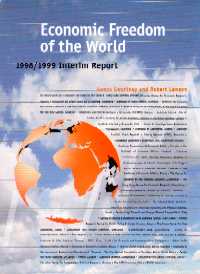 Economic Freedom of the World 1998/1999 Interim Report Economic Freedom of the World 1998/1999 Interim Report
|
||
|
Hong Kong is still rated as the freest economy in the world, according to a research report released recently. The report, entitled Economic Freedom of the World: 1997 Annual Report, is sponsored by the Fraser Institute in conjunction with research organizations, including the Hong Kong Centre for Economic Research, in forty-seven countries. It is the continuation of a decade-long effort to develop a comprehensive and accurate measure of differences in the level of economic freedom across countries. It updates and expands the findings presented in Economic Freedom of the World: 1975-1995. Nobel Laureate Gary Becker said of the report: "We presume that economic freedom contributes to economic prosperity and growth by encouraging creative entrepreneurship and a more productive work force. Yet research on this subject has been hampered by incomplete and inadequate measures of freedom in economic life. This Report helps fills the void with detailed measures for over one hundred nations. It will be an invaluable source for studies of the determinants of economic growth, and for understanding the relation between economic, political and civil freedom." The central elements of economic freedom are personal choice, freedom of exchange, and protection of private property. Thus, a good measure of economic freedom will identify the extent to which rightly acquired property is protected and to which individuals are free to choose for themselves and engage in voluntary transactions. The seventeen components included in the Index of Economic Freedom reflect these criteria. Data for the seventeen components of the index were compiled for 115 countries, and statistical procedures were used to assign each country a component rating between zero and ten. Ten represents the highest possible rating, and zero represents the lowest. The components were grouped into four major areas: money and inflation, government operations and economic structure, takings, and international trade. The component ratings were then used to derive a summary rating for each country. The summary rating provides an indication of the degree to which a nation's institutional arrangements and policies are consistent with sound money, reliance on markets, avoidance of plunder and discriminatory taxes, and freedom of international exchange. Country ratings were also derived for the years 1975, 1980, 1985, and 1990. These ratings make it possible to track the economic freedom of a country over a two-decade period. An increase in a country's summary rating indicates that it is moving toward liberalization and that the economic freedom of the citizenry is expanding. In contrast, a reduction in the summary rating suggests a decline in economic freedom. By a significant margin, Hong Kong was the highest-rated country in the world in 1995, as it had been in each of the four prior rating years. Singapore, New Zealand, the United States, and, surprisingly, Mauritius round out the top five countries. During the last two decades, the level of economic freedom has been generally increasing throughout the world. New Zealand has enjoyed the largest increase in economic freedom since 1985, while Venezuela has suffered the greatest loss. Since the collapse of communism, the economies of Eastern Europe and the former Soviet Union have gone through a dramatic period of transition. The Fraser index indicates that during the 1990s these economies have been taking significant strides in the direction of economic liberalism. The 1997 report rates China and Russia for the first time. Among the 115 countries in the study, China ranks 81st and Russia 105th. Their ratings, thought low, have risen. China's rating rose from 2.3 in 1980 to 3.9 in 1990 and 4.3 in 1995. Russia's rating rose from 0.9 in 1990 to 3.5 in 1995. Economic freedom and prosperity are strongly related. According to the index, the average per capita GDP of the freest economies was US$14,829, while the corresponding average for the least free economies was a paltry US$2,541. Between 1985 and 1996 the freest economies registered a 2.9 percent average growth rate of per capita GDP. For the least free countries, the per capita GDP fell at an annual rate of 1.9 percent during the same period. Thus, both per capita GDP and its growth rate are positively linked with economic freedom. This positive correlation suggests that countries that follow policies more consistent with economic freedom reap a payoff in the form of more rapid economic growth that leads to higher living standards. Will Hong Kong remain the freest economy in the world now that the handover has taken place? The answer to this question depends in a large part on the future of China and on the actual implementation of the "one country, two systems" concept. The SAR government will be under pressure to show its mettle and will be tempted to take a more proactive role in the economy. The Fraser report provides a timely reminder that Hong Kong's prosperity is critically dependant on its economic freedom, which is rooted in personal choice, freedom of exchange, and the protection of property rights. The policy of "positive non-intervention" has served Hong Kong well over the years. Any deviation from this policy will be costly. |
||
|
The Fraser Institute, in conjuction with research institues in 10 other ountries, including the HongKong Centre for Economic Research has released the first comprehensive economic freedom index, rating more than 100 countries over the years 1975 to 1995. Economic Freedom of the World: 1975-1995 is the product of 10 years' work involving 61 researchers in 11 countries, including many of the world's leading economists. The study measures the extent to which the citizens of a country are free to engage in different economic activities. The index, which ranks Hogn Kong 1st out of 103 nations, is based on 17 separate measurable components in four groups as follows: Money and
Inflation
Government
operations and regulations
The index is different from other indices in that it is based on strictly measurable apects of each nation's economy. It is also the first index which measures the influence of economic freedom on growth over an extended period of time. According to the Fraser Institute's ececutive director, Dr. Michael Walker, those ountries which had an increase in their economic freedom experienced higher rates of economic growth. "Countries like Japan, Singapore and Chile - which expereinced a one-unit increase in freedom between 1980 and 1990 - had increases in their per capita GDP averaging more than three percent annually," said Dr. Wlaker. "Conversely, countires such as Algeria, Tanzania, Venezuela and Nicaragua - which had the largest reductions in economic freedom - had shrinkage in their levels of per capita income.” Countries scoring "A" on the economic freedom index had average incomes of $15,834, while those scoring "F" had an average income of $3,180. "This study indicates the extent to which a country's economic freedom is related to its level of income," noted Walker. The implication is that we must endeavour to preserve economic freedom in Hong Kong or suffer a decline in economic prosperity. The report on Hong Kong was good-news bad-news mixture. The good news is that Hong Kong's rating has been steady and persistently high throughout the last three decades. However, the study highlighted an "obvius weakness" for Hong Kong: our economic freedom index has declined somewhat in recent years. |
||
| |
Index | Research Projects | HKCER Letters
| | Monographs | Speaker program / Conference | |
||

